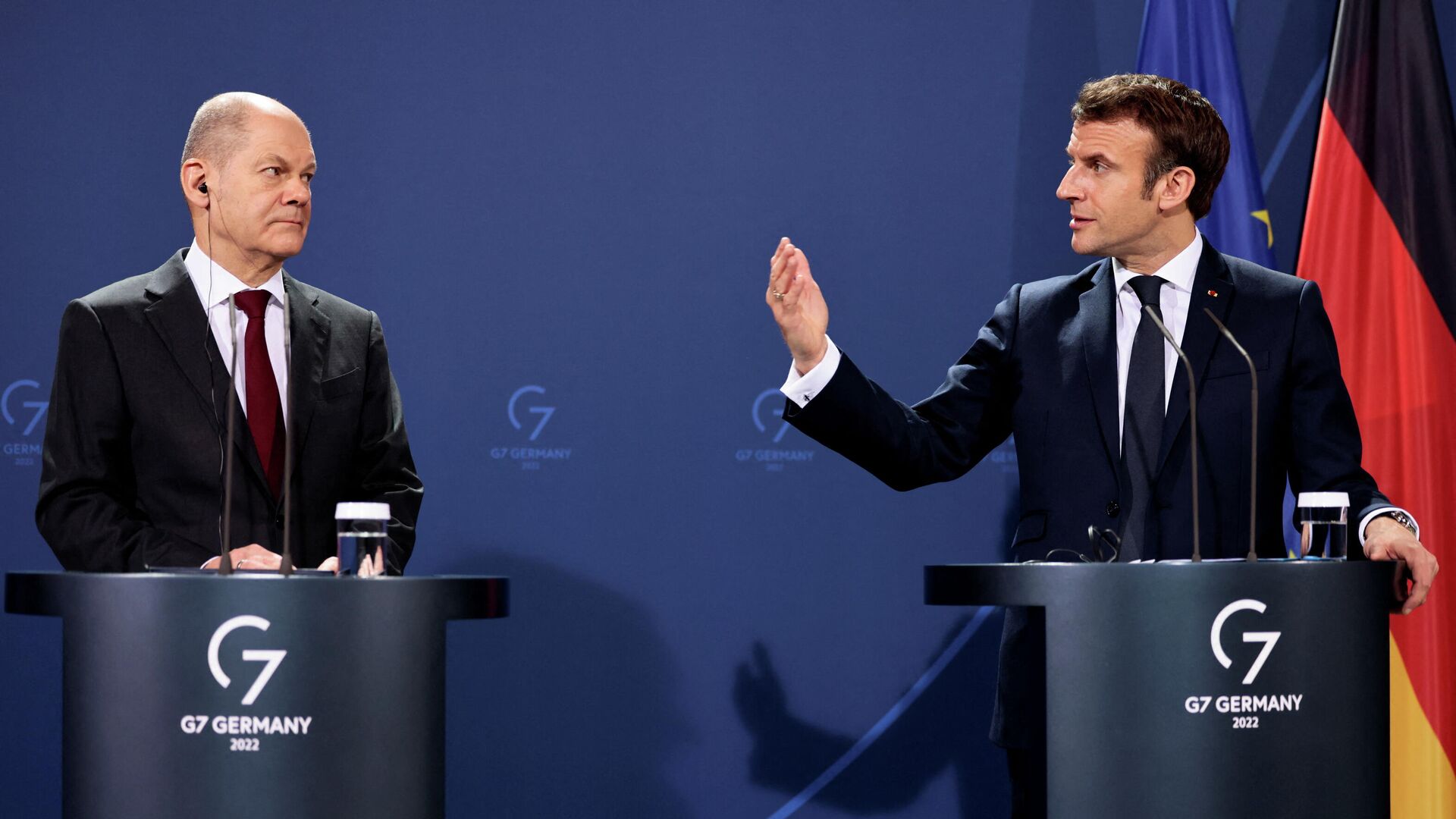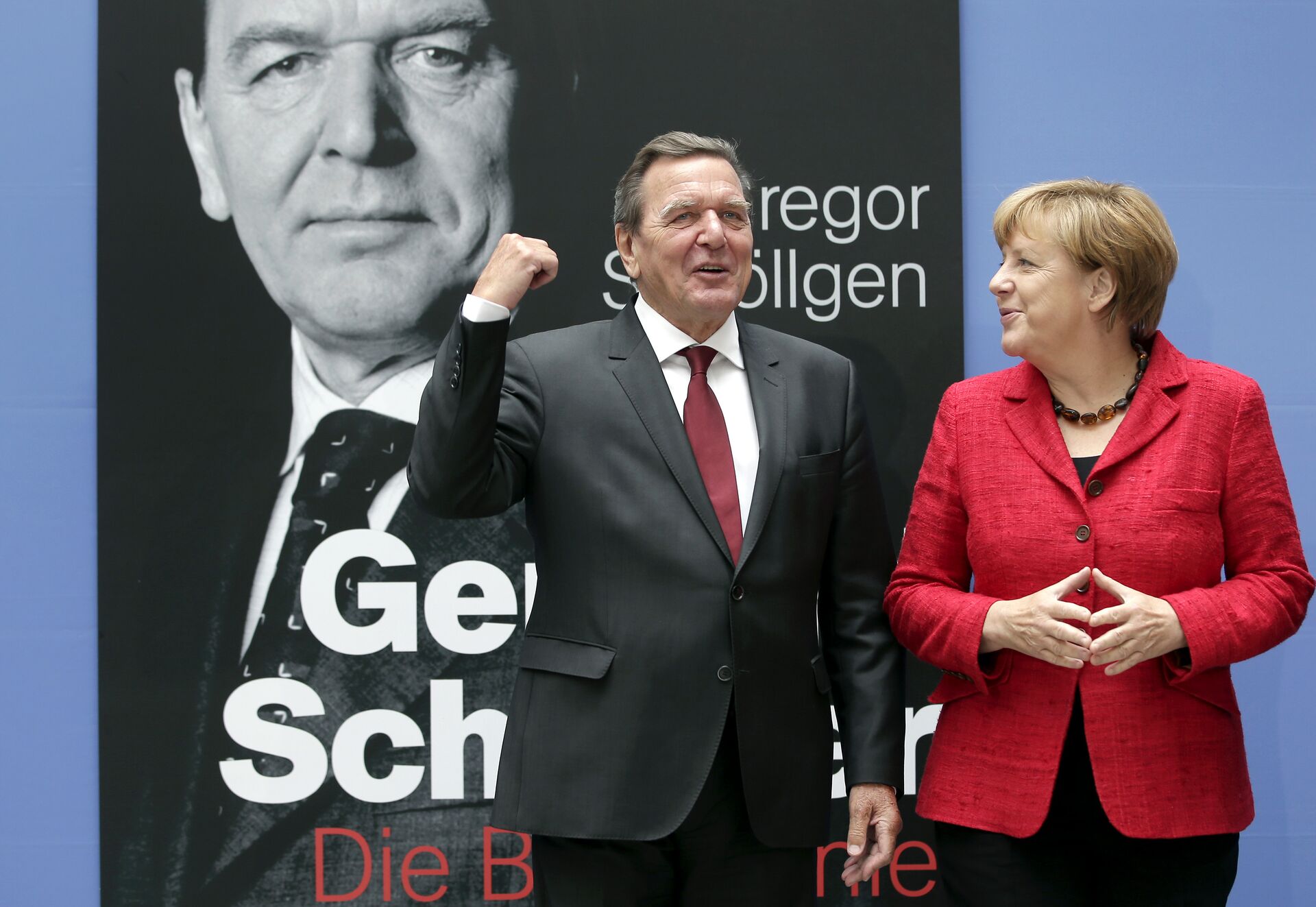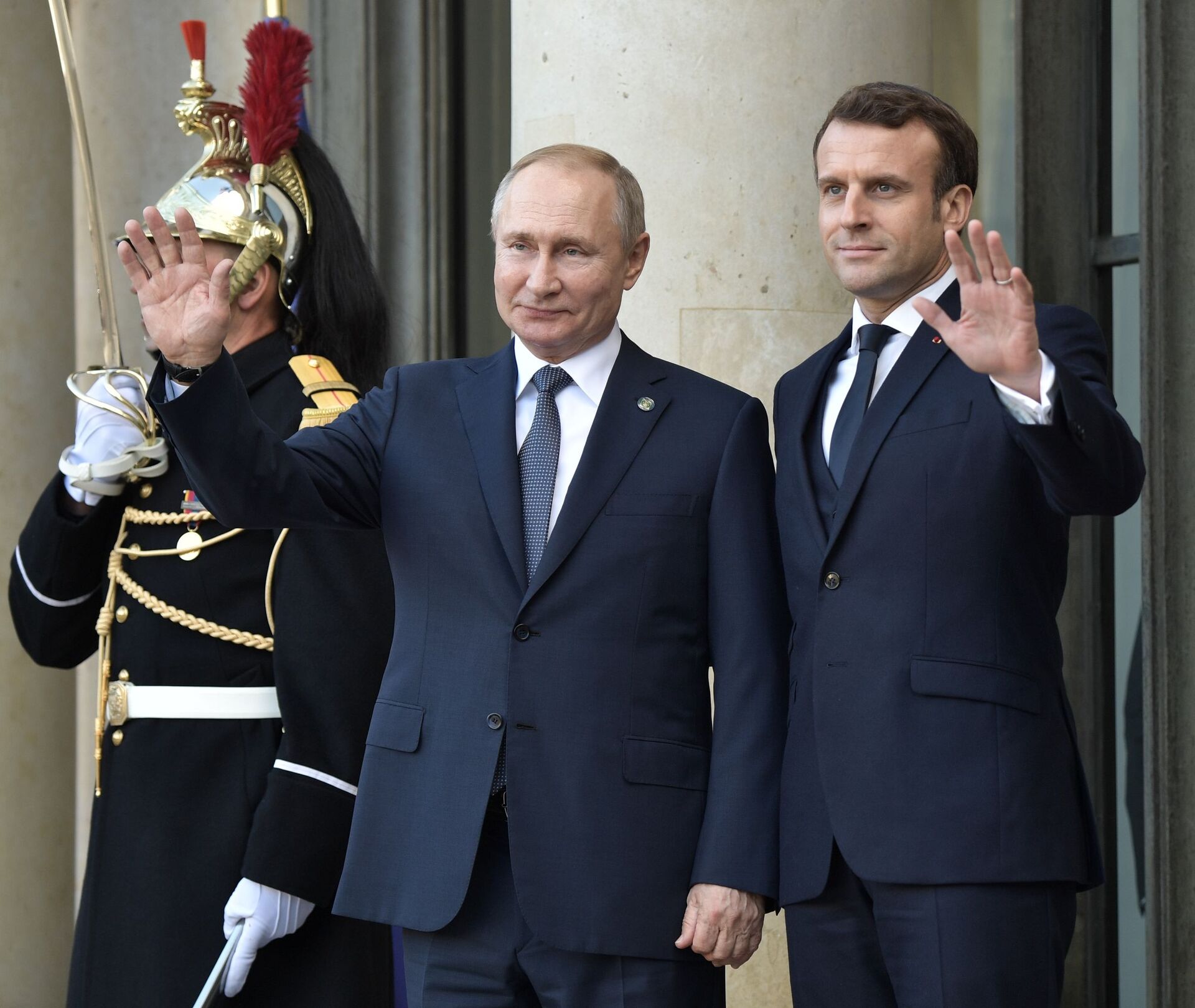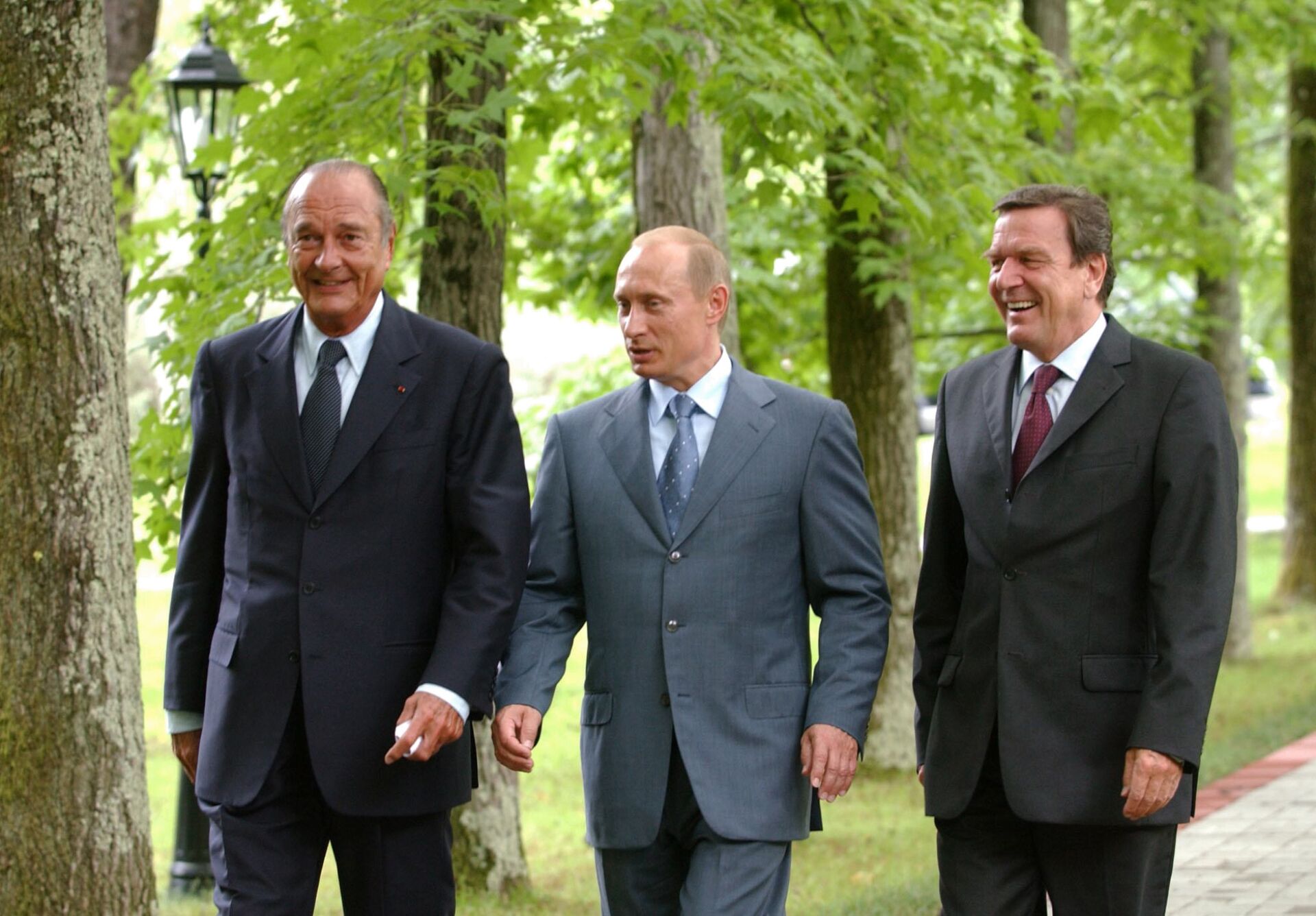https://sputnikglobe.com/20220209/russia-talks-macron-scholz-seeking-to-reduce-us-interference-in-eu-affairs-french-politician-says-1092888052.html
Russia Talks: Macron, Scholz Seeking to Reduce US Interference in EU Affairs, French Politician Says
Russia Talks: Macron, Scholz Seeking to Reduce US Interference in EU Affairs, French Politician Says
Sputnik International
On 15 February, Russian President Vladimir Putin will hold talks with German Chancellor Olaf Scholz, which comes on the heels of Putin's meeting with his... 09.02.2022, Sputnik International
2022-02-09T18:34+0000
2022-02-09T18:34+0000
2023-02-09T11:44+0000
us
world
europe
russia
france
germany
china
nato
security
ukraine
https://cdn1.img.sputnikglobe.com/img/07e6/02/09/1092887464_0:0:3139:1767_1920x0_80_0_0_898e32b0e94faf223d84f9cfda1803d6.jpg
France and Germany have thrown US President Joe Biden under the bus as German Chancellor Olaf Scholz and French President Emmanuel Macron both appear to be trying to de-escalate tensions with Moscow, as the Daily Express noted on Tuesday, citing former US Congressional staff member and author Brandon J. Weichert.Macron & Scholz Follow in Footsteps of Chirac & SchroederOn 26 January, Russia received US-NATO written responses to its draft security proposals submitted to the bloc and American officials in mid-December 2021. Both the US and NATO disregarded Moscow's core demands of the alliance's non-expansion, non-deployment of offensive weapon systems near the Russian border, and the return of the bloc’s European capabilities and infrastructure to the 1997 level.During his Monday meeting with Scholz, US President Joe Biden threatened Moscow with new punitive sanctions and nixing the Nord Stream 2 pipeline project if Russia invades Ukraine – a military scenario repeatedly shredded by the Kremlin as nonsensical. Despite signaling solidarity with Washington, the German chancellor didn't mention abandoning Nord Stream 2 or severing ties with Russia as Berlin's potential moves.One should bear in mind that Scholz was Gerhard Schroeder's pick as the head of the Social Democratic Party (SPD), says Vereycken. Schroeder is a former German chancellor from the SPD who played a key role in promoting the Nord Stream 2 gas pipeline project connecting Russia and Germany and enhanced Russo-German cooperation.In December 2019, Scholz openly criticised US legislation imposing sanctions on Russia’s Nord Stream 2 and declared that "such sanctions are a serious interference in the internal affairs of Germany and Europe and their sovereignty". Moreover, in 1984, when he was still a young Socialist, Scholz denounced the installation of US missiles in West Germany and even called for leaving NATO, the French politician recalls.For his part, French President Emmanuel Macron, who met Vladimir Putin on 7 February, is known for his advocacy of the idea of Europe's "strategic autonomy" and independence from Washington's political diktat. In 2019, the French president subjected NATO to sharp criticism in his interview with The Economist. “What we are currently experiencing is the brain death of NATO”, Macron said.At the same time, Macron was the first among Western European leaders who raised his voice amid the US-Russian row over Ukraine and called upon EU member states to draw up proposals for a new security deal with Russia.According to Vereycken, the Scholz-Macron effort to de-escalate tensions in Europe is in some way comparable to German Chancellor Gerhard Schroeder and French President Jacques Chirac's opposition to the Iraq War started by Washington under the false pretext of "weapons of mass destruction" allegedly possessed by the Saddam Hussein government.Macron Has Good Reasons to Spearhead Security Talks With RussiaMeanwhile, the dynamic of Macron's visit to Moscow on 7 February can create "a very positive momentum", according to Vereycken.Putin and Macron discussed the current issues of European and global security and Moscow's draft security agreements which were largely neglected by the US and NATO. "For the first time, a Western president recognises that the Russians' security concerns are real", Jean de Gliniasty, former French ambassador to Moscow, told French broadcaster BFM TV while commenting on the Putin-Macron talks.At the same time, the French president is playing his own political game, notes the politician. Firstly, Macron last month stated that he wants to stand for a second presidential term. Secondly, France currently holds the presidency of the Council of the European Union, which gives Macron additional leverage. Macron is likely to use the EU Council presidency to coordinate with Germany and European member states in order to work out a common decision with regard to European security, according to the observer.The French president has long been said to be striving to become the new "EU leader", especially after the resignation of former German Chancellor Angela Merkel, dubbed in the press "the de facto leader of the European Union". Besides, in the wake of Brexit, France has become the only EU power with its own nuclear arsenal, which is the third largest in the world.In addition to this, Macron still apparently feels betrayed by the US and the UK after they struck the AUKUS deal with Australia, sidelining France and stripping it of a lucrative submarine contract, according to Vereycken.Vladimir Putin's joint declaration with his Chinese counterpart Xi Jinping earlier this month undoubtedly affected Macron's stance on the unfolding European events too, says the French politician.The global order is shifting and the French president appears to understand the importance of refurbishing post-Cold War rules as the era of US dominance has come to an end, according to the politician.
france
germany
china
ukraine
Sputnik International
feedback@sputniknews.com
+74956456601
MIA „Rossiya Segodnya“
2022
News
en_EN
Sputnik International
feedback@sputniknews.com
+74956456601
MIA „Rossiya Segodnya“
Sputnik International
feedback@sputniknews.com
+74956456601
MIA „Rossiya Segodnya“
us, europe, france, germany, china, nato, security, ukraine, vladimir putin, emmanuel macron, olaf scholz, european union (eu)
us, europe, france, germany, china, nato, security, ukraine, vladimir putin, emmanuel macron, olaf scholz, european union (eu)
Russia Talks: Macron, Scholz Seeking to Reduce US Interference in EU Affairs, French Politician Says
18:34 GMT 09.02.2022 (Updated: 11:44 GMT 09.02.2023) On 15 February, Russian President Vladimir Putin will hold talks with German Chancellor Olaf Scholz, which comes on the heels of Putin's meeting with his French counterpart Emmanuel Macron. What message do Macron and Scholz's negotiations with Moscow send to the US and Europe?
France and Germany have thrown US President Joe Biden under the bus as German Chancellor Olaf Scholz and French President Emmanuel Macron both appear to be trying to de-escalate tensions with Moscow, as the Daily Express
noted on Tuesday, citing former US Congressional staff member and author Brandon J. Weichert.
Macron & Scholz Follow in Footsteps of Chirac & Schroeder
"Macron and Scholz seem to co-deploy their efforts", says Karel Vereycken, a political analyst, journalist, and vice president of Solidarite & Progres, a political party founded by Jacques Cheminade. "In their own way, between Macron and Scholz, the idea of reducing US interference in EU affairs is undoubtedly part of the agenda. Contrary to the US and the UK, they know damn well that a [potential] conflict would take place on their own territory and not some place far away or overseas".
On 26 January, Russia received US-NATO written responses to its draft security proposals submitted to the bloc and American officials in mid-December 2021. Both the US and NATO disregarded Moscow's core demands of the alliance's non-expansion, non-deployment of offensive weapon systems near the Russian border, and the return of the bloc’s European capabilities and infrastructure to the 1997 level.
During his Monday meeting with Scholz, US President Joe Biden threatened Moscow with new punitive sanctions and nixing the Nord Stream 2 pipeline project if Russia invades Ukraine – a military scenario repeatedly shredded by the Kremlin as nonsensical. Despite signaling solidarity with Washington,
the German chancellor didn't mention abandoning Nord Stream 2 or severing ties with Russia as Berlin's potential moves.
One should bear in mind that Scholz was Gerhard Schroeder's pick as the head of the Social Democratic Party (SPD), says Vereycken. Schroeder is a former German chancellor from the SPD who played a key role in promoting the Nord Stream 2 gas pipeline project connecting Russia and Germany and enhanced Russo-German cooperation.
In December 2019, Scholz openly criticised US legislation imposing sanctions on Russia’s Nord Stream 2 and declared that "such sanctions are a serious interference in the internal affairs of Germany and Europe and their sovereignty". Moreover, in 1984, when he was still a young Socialist, Scholz
denounced the installation of US missiles in West Germany and even called for leaving NATO, the French politician recalls.
For his part, French President Emmanuel Macron, who met Vladimir Putin on 7 February, is known for
his advocacy of the idea of Europe's "strategic autonomy" and independence from Washington's political diktat. In 2019, the French president subjected NATO to sharp criticism in his interview with The Economist.
“What we are currently experiencing is the brain death of NATO”, Macron said.At the same time, Macron was the first among Western European leaders who raised his voice amid the US-Russian row over Ukraine and called upon EU member states to draw up proposals for a new security deal with Russia.
According to Vereycken, the Scholz-Macron effort to de-escalate tensions in Europe is in some way comparable to German Chancellor Gerhard Schroeder and French President Jacques Chirac's opposition to the Iraq War started by Washington under the false pretext of "weapons of mass destruction" allegedly possessed by the Saddam Hussein government.
Macron Has Good Reasons to Spearhead Security Talks With Russia
Meanwhile, the dynamic of Macron's visit to Moscow on 7 February can create "a very positive momentum", according to Vereycken.
Putin and Macron discussed the current issues of European and global security and Moscow's draft security agreements which were largely neglected by the US and NATO. "For the first time, a Western president recognises that the Russians' security concerns are real", Jean de Gliniasty, former French ambassador to Moscow, told French broadcaster BFM TV while commenting on the Putin-Macron talks.
"So far Macron clearly lacks the character of Charles de Gaulle or Franklin D. Roosevelt to fully grasp the suicidal dynamics currently threatening world peace, but some of his military advisers are smart enough to conclude from the proverbial 'shadows on the wall', that after 20 days of failing US-Russia negotiations, something really ugly was about start", says Vereycken.
At the same time, the French president is playing his own political game, notes the politician. Firstly, Macron last month stated that he wants to stand for a second presidential term. Secondly, France currently holds the presidency of the Council of the European Union, which gives Macron additional leverage. Macron is likely to use the EU Council presidency to coordinate with Germany and European member states in order to work out a common decision with regard to European security, according to the observer.
The French president has long been said to be striving to become the new "EU leader", especially after the resignation of former German Chancellor Angela Merkel, dubbed in the press "the de facto leader of the European Union". Besides, in the wake of Brexit, France has become the only EU power with its own nuclear arsenal, which is the third largest in the world.
In addition to this, Macron still apparently feels betrayed by the US and the UK after they struck the AUKUS deal with Australia, sidelining France and stripping it of a lucrative submarine contract, according to Vereycken.
Vladimir Putin's joint declaration with his Chinese counterpart Xi Jinping earlier this month undoubtedly affected Macron's stance on the unfolding European events too, says the French politician.
"With Putin and Xi standing side by side in Beijing, and with China backing Russia’s demands for written 'ironclad' security guarantees and Russia opposing the AUKUS containment strategy against China, even the most ideological geo-politicians come to the conclusion that the world is entering a 'post-Western world order'", says Vereycken.
The global order is shifting and the French president appears to understand the importance of refurbishing post-Cold War rules as the era of US dominance has come to an end, according to the politician.





